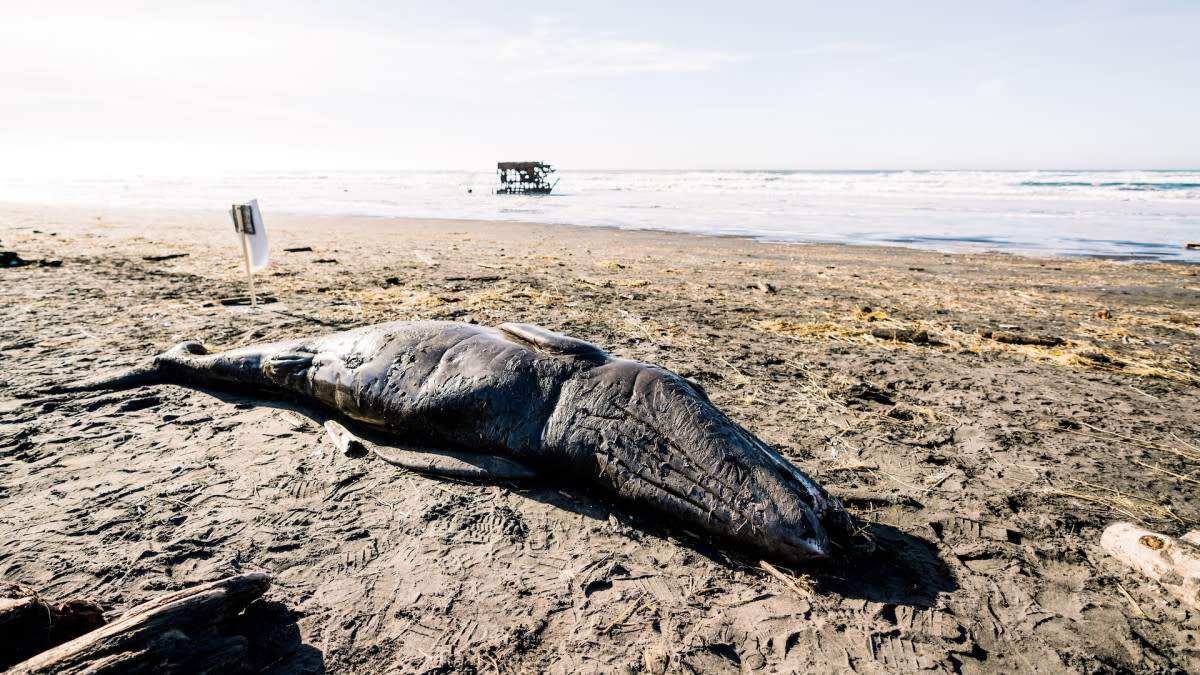Tragic Beached Gray Whale Calf in Oregon Allows Local Native Tribe To Perform Rare Ceremony

A recent tragic death of a whale calf in Bandon ,Oregon provided a unique opportunity for the the Native people who have long called the region home. This week, beachcombers in this community along the southern coast of Oregon were shocked and dismayed to come upon the beached carcass of a juvenile gray whale. After scientists and authorities examined the creature, it was turned over to representatives of the Coquille Indian Tribe, for whom this situation holds great cultural significance.
The beached whale was a juvenile, only twenty feet long. Experts say that gray whales are usually fourteen to sixteen feet long when they are born, so this one was still very young when it succumbed to its injuries.
Related: Video of Orca Whales Playing Near the Shoreline in Washington Is a Must See
The scientists who examined the animal said that it had major trauma to its jaw and underside, indicative of an orca attack. Orcas are particularly known to eat the tongues of whale calfs they kill.
Gray Whales
Gray whales were once nearly hunted to extinction by people, but now laws exist to make them a protected species. Nevertheless, their ranges is far more limited than the oceans they once roamed. They are still often hunted by orcas, however, and that is what happened to this calf.
Gray whales have been slowly been growing in population since the 1970s, when protections were put in place, and now their population is estimated in the twenty thousands. They migrate farther than any other species of whale—over twelve thousand miles.
A Tragedy Becomes a Blessing
Once the whale was discovered on the beach, authorities were contacted by representatives of the Coquille Indian Tribe. Their tribal representative in the Oregon Parks department, recognizing the significance of this occurrence for the tribe, worked to make sure that the members were given a chance to practice their traditional ceremonies.
“We are going to do what our people have done for thousands of years,” said MJ Parrish, one of the Coquille people who participated in the ceremony and retrieval of the carcass. “We are going to celebrate this blessing we have received. We are going to respect this great gift and utilize everything we can.”
The Coquille people traditionally lived on the southern coast of Oregon, and the cycle of marine life there holds great cultural significance for them. According to representatives of the tribe, a beached whale calf like this is seen as a gift from the creator, and is a rare opportunity for them to participate in a rare ceremony.
Their tribe was declared extinct by the government in the twentieth century and members had to fight to revive their designation, which was only achieved in 1989.
“We will make certain not to waste its sacrifice,” said tribe chairman Brenda Meade. “To our knowledge, this is also the first time in generations that our tribe has been able to experience this kind of ceremony. So, this is a truly wonderful gift. And not only for the whale blubber and the bones that we will be able to use. As we prepare to celebrate thirty-five years since being officially restored as a federally recognized tribe, it is so important that we are able to take this opportunity for the cultural education of tribal members and especially for our youth.”
Looking for more PetHelpful updates? Follow us on YouTube for more entertaining videos.
Or, share your own adorable pet by submitting a video, and sign up for our newsletter for the latest pet updates and tips.
